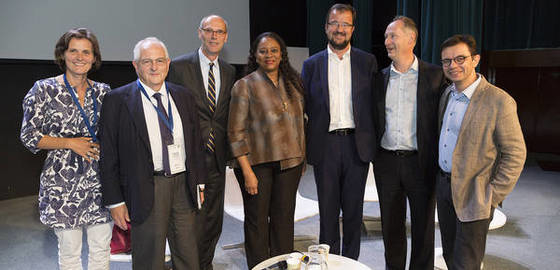How can Finance help build a more sustainable economy?
“Only technology can sort out the uncertainty problems that are involved in all fundamental processes.” With these words, chief economics commentator at the Financial Times , Martin Wolf, closed the final session of the daylong Finance4Good conference. Wolf moderated a session which featured five keynote speakers who discussed the new role finance must play in repairing the world’s battered market economy.

During an engaged two-hour debate, former managing director of the World Bank, Bertrand Badré insisted there was no need to invent new institutions to solve the ongoing global crisis because, as he said, “it’s about making them work.” And to do so, the ex-WB chief financial officer continued, decision-makers must be aware that “the crisis we faced was not only a technical crisis, it was an ethical crisis.”
On the other hand, for Thomas Helman (academic director at the Saïd Business School at Oxford University), the key to solving instability in financial industry is to create trust mechanisms like the blockchain, “the biggest innovation the world is going to remember”. This technology, which allows companies to make and verify transactions in a secure and transparent manner, will help generate new ways of aggregating information. “If we can make finance 1% more efficient, do you have any idea what that would mean given the numbers that we’ve been playing around with?” Helman added challengingly.
World Bank vice-president and treasurer Arunma Oteh begged to disagree with the centrality of Helman’s point. For the Nigerian economist, it is the imbalances of the financial world which must be addressed before all else. “Inequalities affect trust,” she said, “Our goal at the World Bank is to end extreme poverty.” And she went on to declare: “There are things which can help us address inequalities: how we can leverage capital markets for example.”
Oteh’s point were echoed in Wolf’s conclusion: “One thing here remains certain,” said the moderator, “it’s that the future of the economy must rest in the emerging and developing worlds.” And they in turn needed to rely, more than ever, on technological innovation which, Wolf, believes is the only answer to the uncertainty problems plaguing the financial world.
The round-table was the culmination of the HEC Paris Finance for Good event that explored how finance, which plays an key role in our global economy, can address the main challenges of our global society.
The diversity of the panelists allowed them to explore of the role of finance in society through several perspectives:
Arunma Oteh, Vice-president and Treasurer, World Bank
Bertrand Badré, Visiting Fellow at the Peterson Institute for International Economics, expert in impact investing, Former Managing director and World Bank Group Chief Financial officer
Gert Djikstra, Chief Strategy & Communication, member of the Board, APG Asset Management
Thomas Hellmann, Professor of Finance at Saïd Business School, University of Oxford
The debates was moderated by Martin Wolf, chief economics commentator from the Financial times .
This annual conference is organized by the Society & Organizations (SnO) Center, together with professors, students, partners and Alumni association.